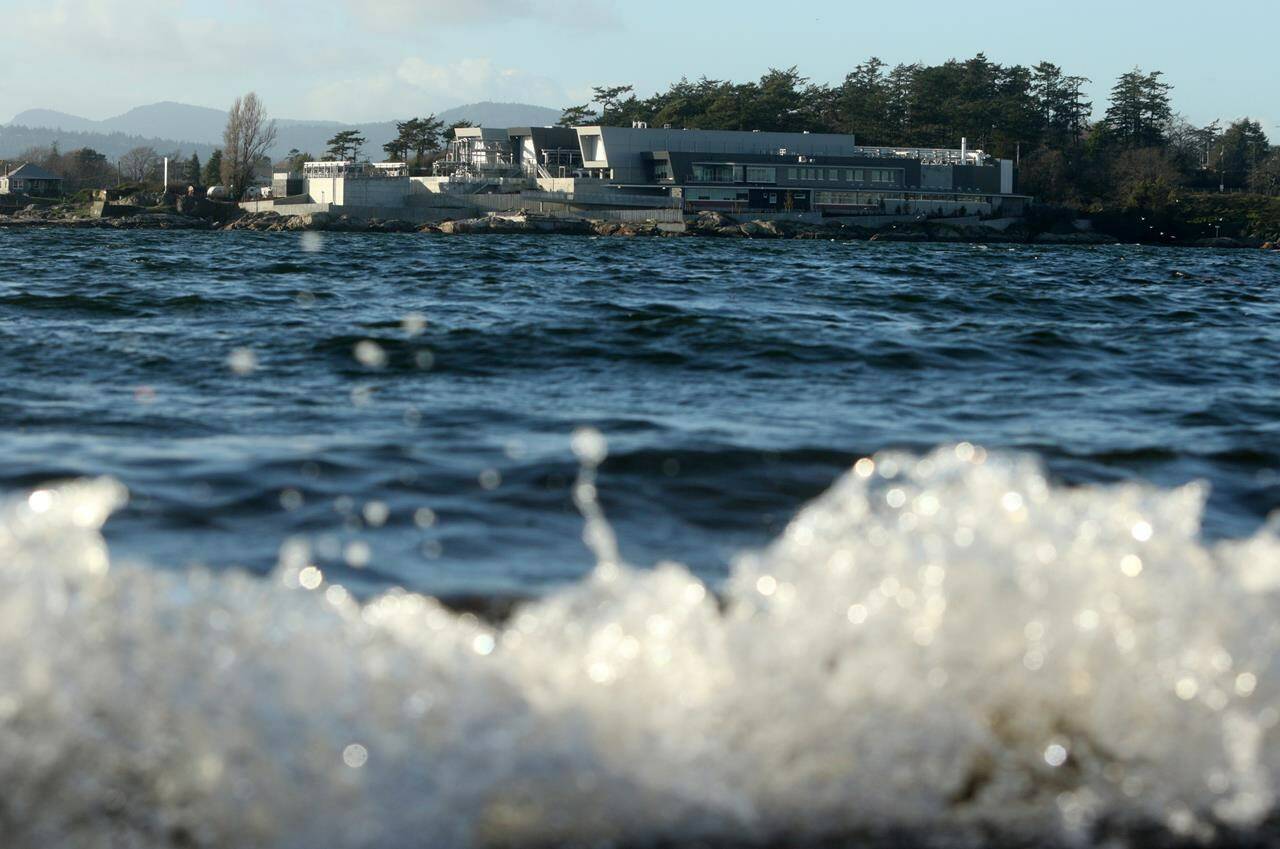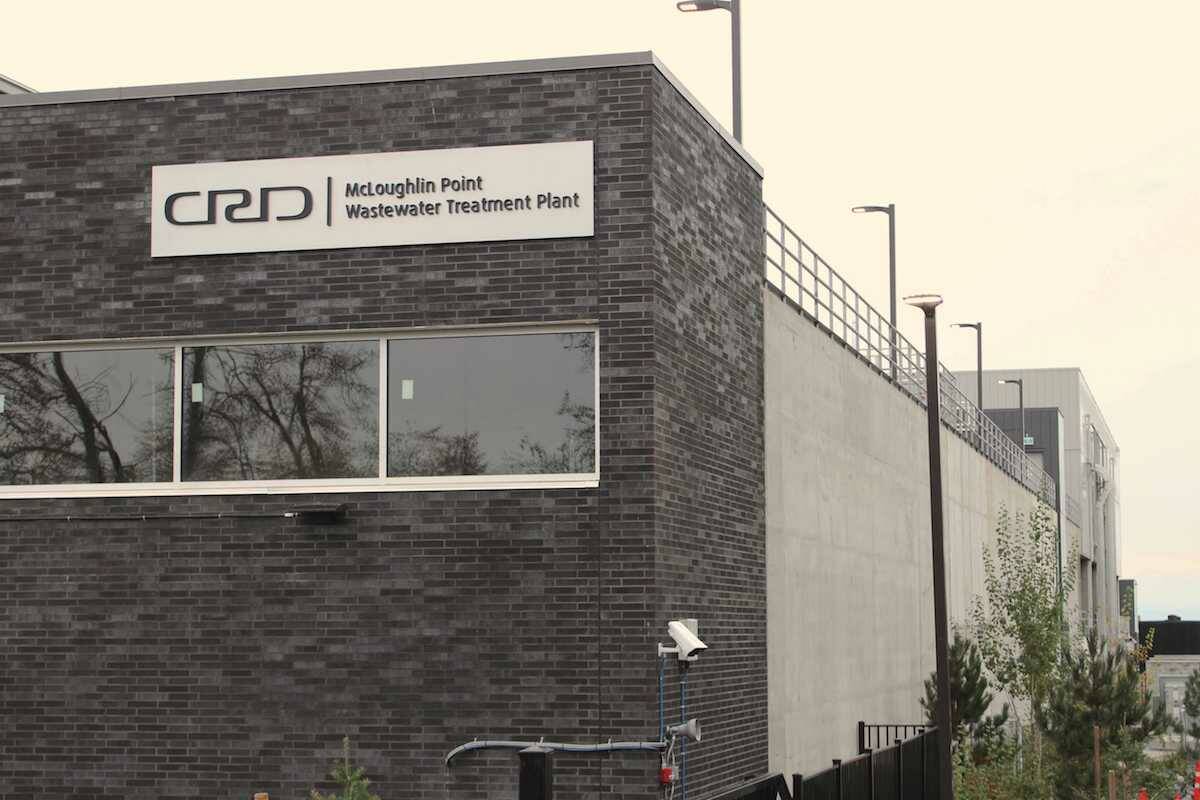With her windows cracked to let the summer night air in, Carole Witter is suddenly hit with an intense cloud of stink as she lies in bed. The gag-inducing odours come and go with the winds, but there have been countless times when Witter has abandoned her outdoor leisure for refuge from the foul smells.
After Greater Victoria’s long-awaited wastewater plant started up almost two years ago, she’s just one of the residents from Vic West and Esquimalt’s West Bay neighbourhood who feel a main promise of the project has so far been broken.
When the Capital Regional District approved the almost $775-million McLoughlin Point Wastewater Treatment Plant, it came with a written agreement that neighbours wouldn’t be subject to unacceptable amounts of odour. That odour has residents and stakeholders questioning if contractual requirements have been met with a final deadline looming.
For its part, the CRD is still studying whether all the smells are actually coming from the treatment plant, which can process 108 megalitres of wastewater per day that come from nine core communities. But several nearby residents who spoke with Black Press Media said they don’t need studies to know their downtime has all too often been ruined by a new stink that’s surfaced after the plant started up.
Witter has lived near West Bay marina for 36 years and represents the neighbourhood on the plant’s liaison committee. She said the new odour is real and she’s “100 per cent” sure it emerged after the plant went online in December 2020.
“There are other smells in West Bay, there’s the seaweed down in West Bay that everyone knows about, it’s not that, it is coming from the sewage treatment plant.”
The CRD board will get a report in the coming months outlining work and commitments that will be done to alleviate odour issues before contracts with the plant builders are closed. That was spurred by a motion by Esquimalt Mayor Barb Desjardins that was passed at a CRD board meeting in October.
Not a day goes by where the township doesn’t hear about the smells, she said.
“I want to remind you, odour control was one of the most important things for our community and for Vic West,” Desjardins said at the Oct. 12 core area liquid waste management committee meeting. “And we have not resolved those odour issues.”
The committee was discussing how a two-year performance period is set to close in mid-January, at which time final payments will be made to Harbour Resources Ltd. – a consortium comprised of Aecom Canada and Graham Infrastructure, contracted to construct the treatment plant. Graham Infrastructure directed Black Press Media to a statement provided by the CRD and Aecom Canada did not respond to interview requests.
The CRD told Black Press Media that the contracts are complex but once the performance period ends, the contractors could potentially receive holdback payments of $5 million for the plant’s completion, in accordance with the project agreement, along with an $800,000 performance incentive.
“We really can’t understand why the CRD would be willing to hand over the remaining money and accept the handover when the odour deficiencies still remain,” said Rozlynne Mitchell, chair of the West Bay Residents Association and another nearby resident.
A host-community agreement with the Township of Esquimalt stated if the plant emits discernible odours beyond its property boundaries, the CRD will use “all reasonable efforts to investigate and remediate the source” in order to reduce the smell to the agreed level. It also included the requirement that the CRD will not accept the treatment plant until it incorporates odour-reducing technology intended to result in smells being unnoticeable past the plant’s site – a point reiterated in the approved motion.
The regional government said it’s committed to keeping odour confined to the property. The Township of Esquimalt also told Black Press Media it’s working diligently with the CRD to ensure all commitments are met per the project agreements.
The McLoughlin facility is equipped with several odour-treating components, state-of-the-art monitoring systems and processing tanks that are covered to trap and treat smelly air, which the CRD said results in “one of the highest levels of odour capture and treatment in the industry.”
During normal operation, the enclosed tanks scrub, capture and monitor foul air while backup equipment and generators reduce the possibility of odour escaping the facility when system failures occur.
But directors on the waste management committee have questioned why a CRD report confirmed those control systems were “fully functional and operating as per the design specifications during normal operating conditions” as of September, but residents continue to comment on the odour.
The CRD told Black Press Media that workers need to periodically access the process tanks, so some odours will escape in those times as the system is opened to the atmosphere. Another point creating concern is that a certifier has said Harbour Resources has met contractual requirements around summer and winter odour testing under the McLoughlin Point Wastewater Treatment Plant project agreement. The contract also included criteria for removing hydrogen sulphide emissions – which carry a rotten egg smell – which the CRD said have already been met. Staff added there could be other odour-causing compounds being generated that aren’t explicitly mentioned in the agreements.
“The contractor has demonstrated through acceptance testing and independent certification, that the plant has achieved compliance with the project agreement requirements,” the CRD said.
At last month’s committee meeting, staff repeatedly said in their view, the outstanding odour concerns fall outside the project agreement requirements.
Dejardins said residents need to know the CRD has their backs going forward and that it’s going to fix the issue, while Mitchell questioned who will be on the hook for paying to stop the smells if the contract is closed.
“It’s not a whiff in the air, it’s a strong, pungent and distinctly identifiable odour,” said Mitchell. “It’s gone on and on and on and it has not gotten any better.”
Resident complaints continue to pour in, but CRD staff said the nature of those complaints means they could be from pipe cross-connection issues where sewage from Vic West homes is discharging into municipal storm drains that are dry in the summer months.
“This waste would be accumulating, likely causing significant odour in those areas,” CRD staff said.
However, the residents who spoke to Black Press Media and Desjardins took issue with that explanation as what they’ve been smelling has only been circulating since the plant started up.
“I understand there are cross connections and I’m glad we found those, but the challenge I have with those is those were there before, and so why do we think those are the ones that are causing all the odour at this point?” Desjardins asked. “I realize there’s been a lot of work done, but it’s not enough yet, residents are not able to enjoy their summer with their windows open.”
Witter noted, “I think what I find frustrating is why are citizens being asked to prove that there is a smell, it’s really up to the CRD to prove that there isn’t.”
The CRD is taking other steps to study and address the smells before the end of the year, including odour testing at different points during the day; modifying a second odour control system to treat air from tertiary treatment processes; and having Vancouver Island University fingerprint chemical odours from different sources to possibly link them to smells present in specific locations.
The report on the odour action will be presented before 2023 as CRD staff said the contract terms will need to be resolved by the end of the year.
Witter said contracts with the community stressed the plant wouldn’t produce any noticeable odours, so the CRD needs to uphold its end of the deal.
“It’s just a whole bunch of shit and it just stinks.”


